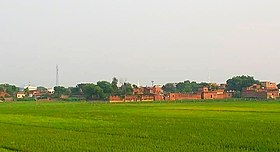Gorasara
Gorasara Gorasara | |
|---|---|
village | |
 | |
| Coordinates: 25°26′N 83°44′E / 25.43°N 83.74°E | |
| Country | |
| State | Uttar Pradesh |
| District | Ghazipur |
| Established | 1655 |
| Founded by | Zamindar Bhikham Khan alias Feqan Khan |
| Government | |
| • Body | Gram panchayat |
| Area | |
• Total | 397.96 ha (983.38 acres) |
| • Land | 380.227 ha (939.561 acres) |
| • Water | 17.733 ha (43.819 acres) |
| Population (2011) | |
• Total | 4,684 |
| • Density | 1,200/km2 (3,000/sq mi) |
| Languages | |
| • Official | Hindi |
| Time zone | UTC+5:30 (IST) |
| Vehicle registration | UP |
| Website | up |
Gorasara is a village located in Dildarnagar Kamsar, Uttar Pradesh, India.[1] Goarasara village was established by Bhikham Khan, son of Fateh Bahadur Khan, and great great grand son of Narhar Khan.
As of the 2011 Census of India, the main population of the village lived in an area of 87.5 acres of land with 637 households.[1]
Agriculture
The soil of the village is rich in minerals.[2] The water level of the village is less than 100 feet deep. The village land extends to the banks of Karmansa River. As of the 2011 census, the area of the village is 983.38 acres. ponds cover 18 acres, with the rest of the land dedicated to other crop production. Many types of crops that grow in the nearby Ghazipur and Buxar districts are grown in the village.[3]
Gorasara has been known for its sunflower farming for more than 300 years. During the summer, sunflowers are planted on a large scale in the village, usually on more than 500 acres of land. Flowers are sent to other cities, states and countries. Sunflowers were used to make sunflower oil in the village during the Mughal and British eras. Rose farming is also done on a large scale. The village is known for its rose plantation done every year to make rose water. Every year different breeds of sunflower and rose are planted on a large scale in the village.[4]
Plantation
When Goarasar village was established by Bhikham Khan (a descendant of Narhar Khan of Kamsar), his son Fateh Bahadur Khan build a large orchard in the village which was named Hazara Bagh. The orchard built by Fateh took over an area of hundreds of bigha and thousands of trees. Now the orchard is owned by his descendants who are Kamsar Pathans.[4]
Historical population
| Year | Pop. | ±% |
|---|---|---|
| 1861 | 1,205 | — |
| 1871 | 1,446 | +20.0% |
| 1881 | 1,807 | +25.0% |
| 1891 | 2,170 | +20.1% |
| 1901 | 2,495 | +15.0% |
| 1911 | 2,994 | +20.0% |
| 1921 | 3,743 | +25.0% |
| 1931 | 4,117 | +10.0% |
| 1941 | 4,325 | +5.1% |
| 1951 | 4,303 | −0.5% |
| 1961 | 4,098 | −4.8% |
| 1971 | 3,884 | −5.2% |
| 1981 | 4,200 | +8.1% |
| 1991 | 4,372 | +4.1% |
| 2001 | 4,500 | +2.9% |
| 2011 | 4,684 | +4.1% |
| Source:Census of India[5][6][7] | ||
Gallery
References
- ^ a b "Bhulekh".
- ^ http://lsi.gov.in:8081/jspui/bitstream/123456789/893/1/20460_1951_GHA.pdf [bare URL PDF]
- ^ Ansari, Saiyad Hasan (1986). "Evolution and Spatial organisation of clan settlements in middle ganga valley".
- ^ a b Nevill, H. R. (13 January 2024). "Ghazipur Gazatteer".
- ^ "Census of India". mospi.gov.in. Archived from the original on 13 August 2008. Retrieved 23 June 2008.
- ^ "2011 census of India".
- ^ "Historical Census of India". Archived from the original on 17 February 2013. Retrieved 5 November 2015.





